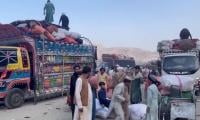A majority of the child abuse cases in Pakistan go unreported, said child protection experts on Friday as they spoke at a seminar organised by the Aga Khan University’s (AKU) Institute for Educational Development (IED).
The seminar was titled ‘Safeguarding Children: Communities, Schools and Online’. It was said that even though Pakistan had a range of laws to protect children, poor implementation of regulations alongside a low conviction rate was causing child abuse to be a persistent problem in society.
Experts also highlighting ways to report child abuse, including dialling 15 to contact police and 1121 to contact the child protection authority.
Dr Kishwar Enam, lecturer at the department of paediatrics at AKU and president of the child protection services of the AKU Hospital, said that globally, seven out of ten cases of child abuse take place at homes, such as residences of victims or offenders.
Dr Enam remarked that this figure was likely to be same in Pakistan but cautioned that the underreporting of crimes meant that the statistics from NGOs and the Sindh government were likely to underestimate the scale of the problem.
“There are many reasons why cases go unreported,” said the speaker. “These include fear of the perpetrator, concerns about being stigmatised by society, economic dependence, inability to recognise child abuse as being improper, poor awareness of ways to complain and lack of trust in the system.”
Speakers at the seminar discussed how neighbourhoods, schools and parents could take steps to reduce the risk of abuse which could happen to children of any race, socioeconomic group, religion or culture.
Lubna Khan, the head teacher at the Berrymede Junior High School in the United Kingdom (UK), spoke of the importance of having a coordinated, multi-agency model that prioritised the children’s well-being.
She noted that each school in the UK had designated child protection officers and all the teachers had to take clearance through the government’s Disclosure and Barring Service, which screened them for criminal conduct.
She informed the event that teachers in the UK were regularly trained and the education sector regulator, Ofsted, also assessed the schools’ ability to keep the children safe.
On the topic of online safety, speakers drew attention to the three C’s of risk —content, contact and conduct. Azra Naseem, director of AKU’s Blended and Digital Learning Network, described how a child could be exposed to disturbing content online, be contacted by a stranger on gaming or social network sites, or be a perpetrator themselves if they shared problematic images or content.
She noted that parents, teachers and other stakeholders should have knowledge about the risks of their children accessing the internet and should discuss these issues with their kids. She also highlighted the importance of dialogue and digital literacy initiatives in protecting
children online.
During the question-and-answer session moderated by IED Dean Professor Farid Panjwani, participants discussed the long-term impact of child abuse on society and how Pakistan’s response to the challenge could be improved.
Dr Enam noted the importance of acknowledging the feelings of the victims of abuse and providing them with support. “Make sure to listen to and support your children. Tell them that they did the right thing by telling you and never silence them or tell them to ignore or forget about the problem. With proper support and timely care, good outcomes are possible helping child and adolescent survivors recover.”
Speakers noted that in the long term, Pakistan needed to invest in awareness programmes to change social norms that perpetuate a culture of silence. The focus should be on supporting children and parents, working directly with children to build their knowledge on how and where to seek help and protection, and educating parents, teachers and adults to identity signs of abuse and make sure that children receive care and protection.
This picture taken on January 30, 2023, shows commuters passing through the Empress Market in Pakistan's port city of...
A representational image showing farmers harvesting wheat crops in a field. — AFP/FileISLAMABAD: In a landmark move...
This representational image shows a number plate. — APP/FileThe public should get new security-featured smart cards...
Japanese Consul General Masaru Hattori addresses an event. — Facebook@JapaneseConsulateKarachi/FileThe Gardenia...
Representational image shows personnel of the Pakistan Customs. — Facebook@Pakistan Customs/FilePakistan Customs...
This representational image shows the Pakistan Coast Guard personnel pictured with recovered narcotics....







